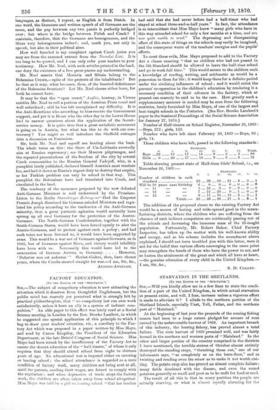FACTORY EDUCATION.
(TO THE EDITOR OF THE "SPECTATOR.'.] Sin,—The subject of compulsory education is now attracting the attention which it deserves from thoughtful Englishmen, but the public mind has scarcely yet perceived what is strongly felt by practical philanthropists, that " no compulsory law can ever work satisfactorily, unless it have an ally in a system of indirect com- pulsion." An able paper to this effect was lately read at a Social Science meeting in Loudon by the Rev. Brooke Lambert, in which he suggested one special application of this principle to which I beg to draw your readers' attention, viz., a corollary to the Fac- tory Act which was proposed in a paper written by Miss Mayo, and read by Canon Kingsley, the President of the Education Department, at the late Bristol Congress of Social Science. Miss Mayo had been struck by the insufficiency of the Factory Act to ensure the decent education of the "half-timers," of whom it only requires that they should attend school from eight to thirteen years of age. No educational test is imposed either on entering or leaving school ; the school attendance is regarded as a mere condition of factory work, many children not being sent at all, until the parents, needing their wages, are forced to comply with the regulation ; and when depression of trade stops the factory work, the children are often taken away from school altogether. Miss Mayo was told by a girl on leaving school "that her teacher had said that she had never before had a half-timer who had stayed at school three-and-a-half years." In fact, the attendance is so intermittent that Miss Mayo knew "many girls who have in this way attended school for only a few months at a time, and are now quite unable to read." The depressing and disorganizing effect of this state of things on the schools may easily be imagined, and the consequent waste of the teachers' energies and the pupils' efforts.
To meet these evils, Miss Mayo proposed to add to the Factory Act a clause enacting "that no children who had not passed in the 5th Standard should be allowed to leave the half-time school and go to work full time." This would secure to the children such a knowledge of reading, writing, and arithmetic as would be a possession to them for life ; it would keep them for a definite period under the civilizing influences of school ; and it would enlist the parents' co-operation in the children's education by rendering it a necessary condition of their advance in the factory, which at present can scarcely be said to be the case. How greatly such a. supplementary measure is needed may be seen from the following statistics, lately furnished by Miss Mayo, of one of the largest and best-taught schools in the Potteries. (See Rev. Brooke Lambert's paper in the Sessional Proceedings of the Social Science Association for January 27, 1870.)
Number of Half-timers on School Register, November 26, 1869: —Boys, 272; girls, 132.
Number who have left since February 28, 1869 :— Boys, 80 ; girls, 74.
Those children who have left, passed in the following standards :
STANDARD.
0. i Ir. in. iv. v. vL Totals.
Boys 23 13 17 14 9 2 , . 2 80 Girls ... 0 20 . . 17 18 9 8 2 74 Table showing present state of Half-time Girls' School, i.e., on November 26, 1869 :—
STANDARD.
0. I. II. III. IT. V. VI.
Number of children in each standard 26 ... 39 ... 38 ... 21 ... 4 ... 3 ... 1 Will be 10 years next birthday — 11 — 5 ... 16 ... 3... 0 ... 0 ... 0 ... 0 — 12 — — 13 8 ... 11 ... 15 ... 12 ... 3 ... 3 1 Totals :— 26 ... 39 ... 38 ... 21 ... 4 ...
3 ... 1 The addition of the proposed clause to the existing Factory Act would be a means of lasting and wide-spread good in the manu- facturing districts, where the children who are suffering from the absence of such indirect compulsion are continually passing out of the schools and increasing the immense mass of the ill-taught population. Fortunately, Mr. Robert Baker, Chief Factory Inspector, has taken up the matter with his well-known ability and energy, and as his scheme includes the amendment above explained, I should not have troubled you with this letter, were it not for the belief that various efforts converging to the same point may strengthen the hands of those who have the power to act, and so hasten the attainment of the great end which all have at heart, —the genuine education of every child in the United Kingdom.— I am, Sir, &c.,
S. D. COLLET.
































 Previous page
Previous page